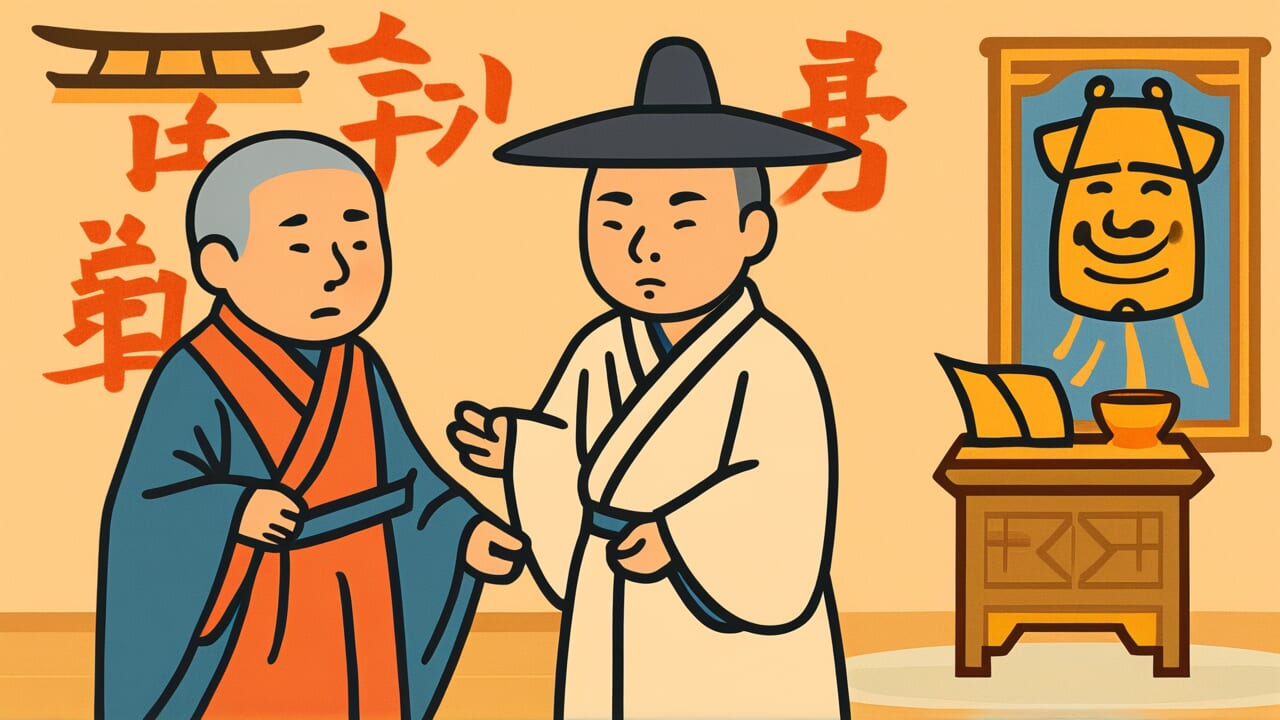How to Read “The silk-robed do not starve to death, but the scholar’s cap often leads one astray”
Wanko wa gashi sezu, jukan wa ōku mi wo ayamaru
Meaning of “The silk-robed do not starve to death, but the scholar’s cap often leads one astray”
This proverb means that children born into wealthy families survive even without ability, protected by family wealth.
However, educated intellectuals often ruin themselves. They pursue ideals and justice so intensely that they misjudge reality.
People use this saying to point out social injustice. It shows how birth circumstances matter more than effort or talent.
It also captures the irony of high ideals going unrewarded. We think of this proverb when honest people lose out, or when smooth operators win.
This pattern still exists today. People with family assets and connections can recover from failure.
Meanwhile, idealistic professionals and researchers walk difficult paths. They refuse realistic compromises.
This proverb remains relevant as a statement of harsh truth about the world.
Origin and Etymology
This proverb likely comes from classical Chinese texts. “Silk-robed” refers to fine silk pants worn by wealthy families’ children.
“Scholar’s cap” means the hat worn by Confucian scholars. It symbolizes educated intellectuals.
In ancient China, the contrast between wealthy children and intellectuals was a social concern.
Those born into rich families never worried about survival. They had family wealth and connections, even without talent or effort.
They never lacked food. They would not starve to death.
Confucian scholars who studied hard often fell into idealism. They valued justice and morality above all else.
They would criticize rulers and become disliked. They looked down on practical survival skills.
As a result, many lived unfortunate lives. Holding high ideals is noble, but they couldn’t balance ideals with reality.
This pattern of intellectuals ruining themselves appeared repeatedly throughout history.
This proverb sharply contrasts the power of birth circumstances with the harsh reality. Learning and ideals alone cannot sustain life.
Usage Examples
- That family’s son doesn’t work and just plays around, but “the silk-robed do not starve to death, but the scholar’s cap often leads one astray”—the serious researcher struggles more
- My friend who started a business pursuing ideals failed, but our wealthy classmate stays fine despite repeated failures—truly “the silk-robed do not starve to death, but the scholar’s cap often leads one astray”
Universal Wisdom
This proverb has survived because it perfectly captures fundamental unfairness in human society.
Deep down, we want to believe that effort brings rewards. We want to think that doing right brings recognition.
But reality shows that birth circumstances—factors beyond personal control—greatly shape our lives.
The deeper truth lies in the danger of holding ideals. People who study and develop high aspirations refuse compromise.
They try to stick to correct principles. This attitude is admirable but easily creates conflict with reality.
The world doesn’t run on logic alone. Human relationships, political maneuvering, timing, and luck all matter.
Ignore these factors, and you’ll become isolated no matter how right you are.
Meanwhile, people who’ve lived without struggle have eyes for reality over ideals.
They instinctively know how to survive. This is ironic but true about human society.
This proverb confronts us with eternal human contradictions. Ideals versus reality. Justice versus survival. Talent versus circumstances.
These tensions never resolve. That’s why this saying continues piercing hearts across generations.
When AI Hears This
Looking at the difference between the wealthy and intellectuals through investment theory reveals a strikingly clear risk structure gap.
Physical capital held by the wealthy can be diversified across multiple assets. Land, gold, silver—various holdings.
If three out of ten assets lose value, the remaining seven sustain life.
Modern investment theory calls this “diversification effect.” Mathematically, when correlation coefficients between assets are below 1, total risk becomes smaller than the simple sum of individual risks.
Physical assets can be sold. When crisis comes, convert to cash and escape.
Multiple defensive walls exist against downside risk.
Intellectual human capital, however, represents terrifyingly concentrated investment. All wealth is bet on a single asset: one’s own brain and knowledge.
This asset cannot be sold or diversified.
Modern human capital theory identifies this illiquidity as the greatest vulnerability. Political regime change can make value drop to zero overnight.
If the civil service examination system is abolished, decades of Confucian learning become worthless.
The beta value—sensitivity to overall market fluctuations—is extremely high.
This proverb points to a cold truth: asset liquidity and diversification capability determine survival probability.
Investing in knowledge can aim for high returns. But it simultaneously means accepting catastrophic concentration risk.
Lessons for Today
This proverb teaches the importance of holding ideals while maintaining balanced perspective on reality.
Pursuing what’s right is wonderful. But that alone won’t sustain you—this is also true.
When you act on conviction, calmly assess whether it’s truly achievable. Can you gain others’ understanding? Is the timing right?
You don’t need to bend your ideals. But think flexibly about how to realize them.
Frontal assault isn’t the only path.
Differences in birth circumstances do exist. Don’t lament this—do your best within your given conditions.
Without a safety net, manage risks more carefully. Act more strategically.
Most importantly, be realistic while holding ideals. Value human relationships while maintaining high aspirations.
This balance is what the proverb wants to tell you today.
Develop the wisdom to live smartly between ideals and reality.



Comments